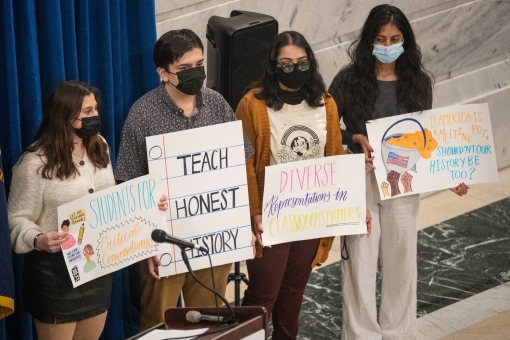|
|
RAND research and commentary on the issues that matter most
|
Feb 24, 2022
|
|
|
|
|
Photo by Joshua Roberts/Reuters
|
|
|
|
As many long feared, Russia has begun its invasion of Ukraine, assaulting the country from three sides, reportedly bombing its major cities, and initiating what looks to be the largest armed conflict in Europe in decades.
Leading up to the attack, a group of unlikely voices in Washington have been calling for U.S. restraint: China hawks. Their argument is that the one true U.S. adversary is China, and responding to Moscow's aggression would detract from America's ability to deter Beijing.
But today's geopolitical reality “does not permit such reductionism,” says RAND's Raphael Cohen. It's a mistake to think of China and Russia as independent problems, because if Russia can act with impunity in Europe, then China can do the same in Asia. What's more, Washington needs its European allies to confront China, says Cohen. If the United States were to leave the Russia problem to the rest of Europe, then what is to prevent Europe from leaving China to the United States?
“If we sit back and allow authoritarian regimes to bully their smaller democratic neighbors into submission without repercussions, it will send a powerful signal to the rest of the world,” he says. Read more »
|

|
|
The Russian flag flies above the Embassy of the Russian Federation, Washington, D.C., February 22, 2022. Photo by Tom Brenner/Reuters
|
|
Economic sanctions threatened by the United States and its allies failed to prevent Russia from attacking Ukraine. Now the West appears ready to make good on those threats. Writing before the invasion, RAND's John Parachini discussed how past sanctions have hurt the Russian economy over time. Today's crisis, he says, may be the ultimate test for sanctions as instruments of statecraft.
Read more »
|
|

|
|
Photo by gilaxia/Getty Images
|
|
More than half of unemployed American men in their 30s have a history of being arrested or convicted of a crime. That's according to a new RAND study. This suggests that government programs may want to focus more on helping people with criminal histories navigate the job market. And if employers are having trouble finding workers, they could reconsider how they view risks posed by applicants with criminal records.
Read more »
|
|

|
|
Volunteers set up information tables at a gas station to raise awareness about human trafficking, Great Falls, Montana, March 31, 2021. Photo by Rion Sanders/USA Today via Reuters
|
|
Substance use disorder is common among victims of sex trafficking. Traffickers may exploit individuals' existing substance use to coerce them into sex trafficking or facilitate substance use to keep victims from leaving. RAND recently convened a panel of subject-matter experts to better understand this problem—and to inform victim-centered responses to help this vulnerable population.
Read more »
|
|

|
|
Students hold signs inside the Kentucky Capitol Rotunda in opposition to bills aimed at eradicating critical race theory from state schools, January 12, 2022. Photo by Alton Strupp/USA Today via Reuters
|
|
Many states are passing or considering laws that limit the discussion of racism, sexism, and bias in their classrooms. But a large body of research suggests that teaching about these issues can lead to positive outcomes for students. Results from a new RAND survey provide insights into which teachers engage in anti-bias education, how prepared they feel to teach anti-bias subjects, the instructional materials they use, and more.
Read more »
|
|

|
|
Photo by aaabbc/Adobe Stock
|
|
Since 2004, the United Kingdom has seen a sharp decline in students learning new languages. This will likely have a negative effect on the UK's ability to compete internationally. A new report by researchers from RAND Europe and the University of Cambridge finds that investing in language education—specifically Arabic, Mandarin, French, or Spanish—in secondary schools could increase UK GDP by billions of pounds over 30 years.
Read more »
|
|
|
You already get the latest insights from RAND in your inbox. Why not your earbuds?
Policy Currents is available as a weekly podcast. New episodes every Friday.
Subscribe now »
|
|
|
|
|